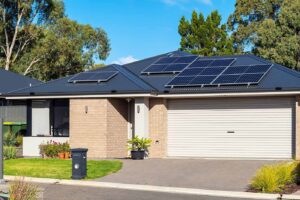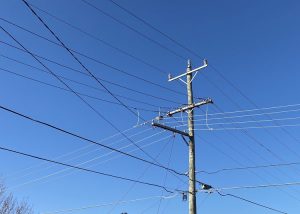Utilities are striking back at rooftop solar by changing their billing structure. Changed industry conditions call for innovation, not impediments. Australian Ethical’s International Share’s Portfolio Manager, Nathan Lim, explains.

Utilities are being sneaky
We previously wrote about how it is a mistake to think utilities will disappear with the growth of distributed generation. Utility companies could be expected to respond to the challenges to their dominance with the growth of rooftop solar. However, their response to date could best be described as sneaky.
The current utility business model
Utilities around the world pretty much all use the same approach to earning a profit. With government regulatory oversight, they determine the total cost of providing their service and then pass this cost with a reasonable mark-up on to its customers. The cost to customers has traditionally been a blend of a fixed and a consumption-based charge, with the fixed charge component typically small to encourage energy conservation.
In essence, a household would be rewarded with a lower bill when they used less energy. Alternatively, a bill that was 100% fixed would mean households would experience no savings by using less energy and, in fact, might use more. Just think about how much you ate the last time you went to an all- you-can-eat restaurant!
How rooftop solar upsets the utilities
Customers who install solar panels reduce their energy consumption from the utility. Based on the current utility charging approach, less power consumption results in less revenue and less profit. Unsurprisingly, utilities have started to lobby their regulators for changes in their charging structure. They increasingly are now opting to increase fixed charges while simultaneously reducing variable charges. To a typical non-solar household, the change is often invisible as there will frequently be little or no impact on their bill. However, by shifting more of the monthly bill into the fixed category, the benefit of installing solar is greatly diminished. In effect, the utility has found a way to take back the lost revenue a household saves when they go solar.
The rise of fixed charges
Fixed charges are going up everywhere. According to the NC Clean Energy Technology Center in their quarterly assessment of the US solar policy, 32 fixed charge increases have been proposed in 18 states. The average proposed increase is seeking a 59% increase in the monthly fixed charge from US$9.70 to US$15.45 for all customers (solar and non-solar). Thankfully, of the 15 proposals decided in the June quarter, only nine got an increase and then only at about half the amount requested.
Utilities have also sought increases that specifically target solar households. Five states are considering such solar-specific charges. Two states are basing the charge on the size of the solar panel system, and three states are basing charges on peak demand. Peak demand charges have traditionally been reserved for business as they can put significant, intermittent strain on the system due to their size.
For example, think of a factory with hundreds of workers that suddenly turn on its air conditioning for the entire facility for an hour until the hottest part of the day passes. A peak demand charge is calculated by observing the maximum load a customer draws over the day. This peak typically only lasts a short period, but the utility must have significant resources on standby ready to deal with these daily surges. Incredibly, utilities are now applying the same logic to households targeting surges in their uses to drive solar-specific charges.
We can see this happening in Australia
Even here in Australia, the Queensland Competition Authority (QCA) recently raised the monthly fixed charge for households and lowered the consumption charge. The monthly fixed charge rose 28% while the consumption charge (variable portion) fell 12%.
Using the table below from the QCA we can see the impact on households:
Based on the latest data from Energex, we estimate the typical Queensland home uses 5,939 kilowatt hours of electricity per year. Conversely, the average home with solar only uses 2,641 kilowatt hours. Looking at the first column of the QCA table above, a household that consumes 6,000 kilowatt hours will see a 3.7% reduction in their bill (last column). However, smaller consumers (like a solar household) will see an increase of between 2.5 – 7.1%. This feels a lot like solar is under attack.
There need not be a war
In fairness, utilities need to earn something for maintaining the grid. Solar households predominately still need grid power when it is dark or overcast, so they rightfully should pay something as long as they remain connected. We are merely concerned that utilities will prefer to only lobby for higher fixed charges instead of adapting their business model to the changing realities of the grid.
As customers, we need to remain vocal regardless of whether we have solar or not. We need to keep challenging the utilities and regulators to keep the system both fair and progressive. When companies face change, we do not (and should not) reward those that sit still and fight the tide. Consider Kodak or Seven West Media, who did not adapt to changed industry conditions.
Kodak is now bankrupt having famously invented the digital camera but then concealing it to protect their film business. Seven West has yet to adapt fully to the digital era and now face a new threat from Netflix. Seven West’s stock price continues to make new all-time lows.
Times are changing for utilities and we believe they need to redefine their role in the grid. In the future, we see utilities more focussed on delivering reliability and facilitating the movement of energy between producers and consumers, whoever they may be. There need not be a war on solar – but it is up to the utilities to stop behaving like there is one.
Nathan Lim is a portfolio manager with Australian Ethical Investment.








